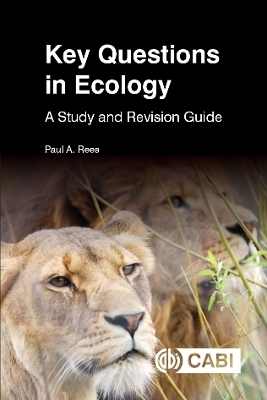
Key Questions in Ecology
CABI Publishing (Verlag)
978-1-78924-757-2 (ISBN)
An understanding of ecology is an important requirement of a wide range of academic areas, including biology, zoology and environmental science. This book is a study and revision guide for students following programmes of study in which ecology is an important component. It contains 600 multiple-choice questions (and answers) set at three levels - foundation, intermediate and advanced - and grouped into 10 major topic areas: · The history and foundations of ecology · Abiotic factors and environmental monitoring · Taxonomy and biodiversity · Energy flow and production ecology · Nutrient and material cycles · Ecophysiology · Population ecology · Community ecology and species interactions · Ecological genetics and evolution · Ecological methods and statistics The book has been produced in a convenient format so that it can be used at any time in any place. It allows the reader to learn and revise the meaning of ecological terms, the basic processes operating in ecosystems, the dynamics of populations, ecological genetics and the process of evolution, the methods used in ecological surveys, and much more. The structure of the book allows the study of one topic area at a time, progressing through simple questions to those that are more demanding. Many of the questions require students to use their knowledge to interpret information provided in the form of graphs, data or photographs, providing a useful tool for independent study.
Paul Rees was a senior lecturer in the School of Science, Engineering and Environment at the University of Salford, United Kingdom, for 22 years until his retirement in 2020. He holds a BSc in Environmental Biology from the University of Liverpool and a PhD in animal ecology and behaviour from the University of Bradford. Paul previously lectured at three Further Education Colleges and a Higher Education College in the United Kingdom, and trained biology teachers at Sokoto College of Education in Nigeria. He has taught from GCE 'O'/GCSE level to MSc level and has been an external examiner for a range of taught programmes, from Higher National Diploma to MSc level, at six British universities. Paul has published papers on mammal behaviour and ecology, wildlife law, and the role of zoos in conservation, along with eight textbooks concerned with ecology, zoo biology, wildlife law and elephants. He is the author of Key Questions in Ecology: A Study and Revision Guide and Key Questions in Applied Ecology and Conservation: A Study and Revision Guide.
1: The history and foundations of ecology 2: Abiotic factors and environmental monitoring 3: Taxonomy and biodiversity 4: Energy flow and production ecology 5: Nutrient and material cycles 6: Ecophysiology 7: Population ecology 8: Community ecology and species interactions 9: Ecological genetics and evolution 10: Ecological methods and statistics 11: Answers
| Erscheinungsdatum | 01.09.2020 |
|---|---|
| Reihe/Serie | Key Questions |
| Verlagsort | Wallingford |
| Sprache | englisch |
| Maße | 156 x 234 mm |
| Gewicht | 508 g |
| Themenwelt | Naturwissenschaften ► Biologie ► Botanik |
| Naturwissenschaften ► Biologie ► Ökologie / Naturschutz | |
| Naturwissenschaften ► Biologie ► Zoologie | |
| ISBN-10 | 1-78924-757-8 / 1789247578 |
| ISBN-13 | 978-1-78924-757-2 / 9781789247572 |
| Zustand | Neuware |
| Haben Sie eine Frage zum Produkt? |
aus dem Bereich


